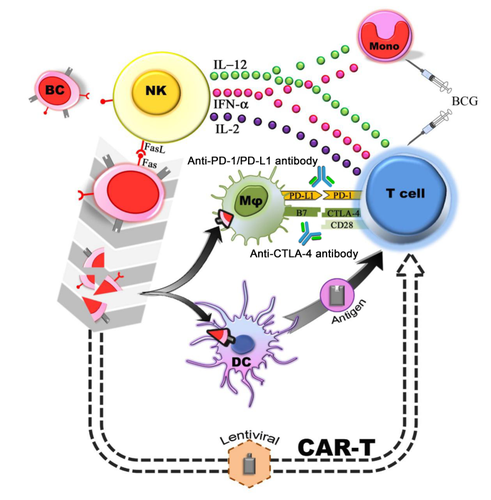-
Home
-
About JCTR
-
Gold Open Access
-
Issues
-
Editorial board
-
Author guidelines
-
Publication fees
-
Online first
-
Special issues
-
News
-
Publication ethics
-
Partners
-
Submit your manuscript
-
Submit your review report
-
Editorial Office
-

This work is licensed under a Creative Commons Attribution-NonCommercial 4.0 International License. ISSN print: 2382-6533 ISSN online: 2424-810X
Volume 7 issue 4
Immune escape mechanisms and immunotherapy of urothelial bladder cancer
Zhao Yang#*, Yinyan Xu#, Ying Bi#, Nan Zhang, Haifeng Wang, Tianying Xing, Suhang Bai, Zongyi Shen, Faiza Naz, Zichen Zhang, Liqi Yin, Mengran Shi, Luyao Wang, Lei Wang, Shihui Wang, Lida Xu, Xin Su, Song Wu*, Changyuan Yu*
Yang et al. J Clin Transl Res 2021; 7(4):9
Published online: July 30, 2021
Abstract
Background and aim: Urothelial bladder cancer (UBC) is a common malignant tumor of the urogenital system with a high rate of recurrence. Owing to the sophisticated and largely unexplored mechanisms of tumorigenesis of UBC, the classical therapeutic approaches including transurethral resection and radical cystectomy combined with chemotherapy have remained unchanged for decades. However, with increasingly in-depth understanding of the microenvironment and the composition of tumor-infiltrating lymphocytes of UBC, novel immunotherapeutic strategies have been developed. Bacillus Calmette-Guerin (BCG) therapy, immune checkpoint blockades, adoptive T cell immunotherapy, dendritic cell vaccines, etc. have all been intensively investigated as immunotherapies for UBC. This review will discuss the recent progress in immune escape mechanisms and immunotherapy of UBC.
Methods: Based on a comprehensive search of the PubMed and ClinicalTrials.gov database, this review included the literature reporting the immune escape mechanisms of UBC and clinical trials assessing the effect of immunotherapeutic strategies on tumor or immune cells in UBC patients published in English between 1999 and 2020.
Results: Immune surveillance, immune balance, and immune escape are the three major processes that occur during UBC tumorigenesis. Firstly, the role of immunosuppressive cells, immunosuppressive molecules, immunosuppressive signaling molecules and dendritic cells in tumor microenvironment are introduced elaborately in the immune escape mechanisms of UBC section. Additionally, recent progress of immunotherapies including BCG, checkpoint inhibitors, cytokines, adoptive T cell immunotherapy, dendritic cells and macrophages on UBC patients are summarized in detail. Finally, the need to explore the mechanisms, molecular characteristics and immune landscape during UBC tumorigenesis and development of novel and robust immunotherapies for UBC are also proposed and discussed.
Conclusion: Currently, BCG and immune checkpoint blockades have been approved by the US Food and Drug Administration for the treatment of UBC patients and have achieved encouraging therapeutic results, expanding the traditional chemotherapy and surgery-based treatment for UBC.
Relevance for patients: Immunotherapy has achieved desirable results in the treatment of UBC, which not only improve the overall survival but also reduce the recurrence rate and the occurrence of treatment-related adverse events (TRAEs) of UBC patients. Additionally, the indicators to predict the effectiveness and novel therapy strategies, such as combination regimen of checkpoint inhibitor with checkpoint inhibitor or chemotherapy, should be further studied.

DOI: http://dx.doi.org/10.18053/jctres.07.202104.009
# contributed equally to this work
Author affiliation
1. College of Life Science and Technology, Beijing University of Chemical Technology, Beijing 100029, China
2. College of Life Science, Key Laboratory of Protection and Utilization of Biological Resources in Tarim Basin of Xinjiang Production and Construction Corps, Tarim University, Alar 843300, Xinjiang, China
3. Department of Urology, The Affiliated Luohu Hospital of Shenzhen University, Shenzhen University, Shenzhen 518000, China
4. Department of Urology, The Second Affiliated Hospital of Kunming Medical University, Kunming 650101, China
5. Department of Urology, Xuanwu Hospital, Capital Medical University, Beijing 100053, China
*Correspondence author
Zhao Yang,
College of Life Science and Technology, Beijing University of Chemical Technology, Beijing 100029, China
College of Life Science, Key Laboratory of Protection and Utilization of Biological Resources in Tarim Basin of Xinjiang Production and Construction Corps, Tarim University, Alar 843300, Xinjiang, China
Email: yangzhao@mail.buct.edu.cn
Song Wu
Department of Urology, The Affiliated Luohu Hospital of Shenzhen University, Shenzhen University, Shenzhen 518000, China
Email: doctor_wusong@126.com
Changyuan Yu
College of Life Science and Technology, Beijing University of Chemical Technology, Beijing 100029, China
Email: yucy@mail.buct.edu.cn
Handling editor:
Michal Heger
Department of Pharmaceutics, Utrecht University, the Netherlands
Department of Pharmaceutics, Jiaxing University Medical College, Zhejiang, China

